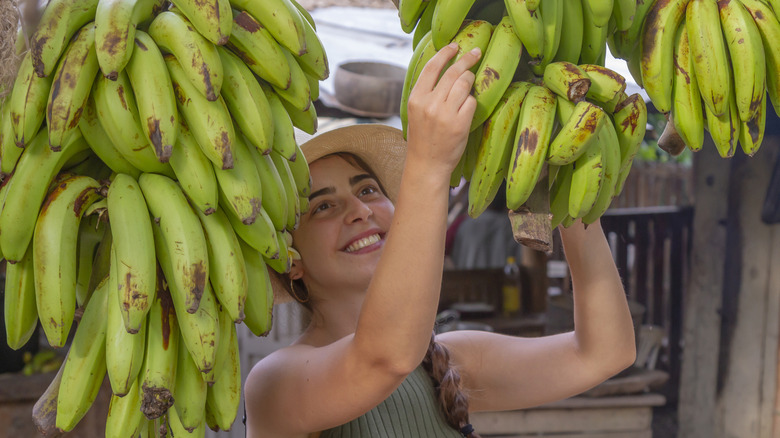A Starchy Fruit High In Magnesium Can Also Lower High Blood Pressure
According to the United States Department of Agriculture (USDA), most adults weren't getting enough magnesium between 2013 and 2016. Back then, the average man consumed 344 milligrams of magnesium daily; the average woman took in less at 270 milligrams. These numbers fell short of the recommended daily values of 400 to 420 milligrams (adult males) and 310 to 320 milligrams (adult females). They also indicated that some people may be at risk of experiencing fatigue, cramping, heart rhythm anomalies, and seizures. (Here are some of the biggest warning signs of a magnesium deficiency.)
Recently, TikTok has been buzzing about magnesium's touted health benefits. (Sleepy Girl Mocktail, anyone?) With that in mind, more people seem to be aware of the benefits of adding more magnesium to their diets, since it's an essential mineral that the body can't produce on its own. If you'd rather eat magnesium-rich foods than take a magnesium supplement, consider adding plantains to your plate. Plantains are starchy fruits that look deceptively like yellow "dessert" bananas (after all, they're part of the banana family), but they're not very sweet. That's why they're typically cooked (e.g., baked, boiled, or fried) rather than eaten raw.
Plantains are a potent potassium source
Plantains are chock-full of magnesium: a one-cup serving of plantain slices offers 53 milligrams of magnesium. If you're having difficulty meeting your recommended magnesium daily intake, you can easily achieve this by adding a serving of mashed or roasted plantains to your diet as a snack or side dish.
Aside from magnesium, plantains contain two other nutrients that can give your cardiovascular system an extra boost. These are potassium (721 milligrams for one cup of plantains) and fiber (2.52 grams per cup), both of which can reduce blood pressure levels.
Potassium is known for getting excess sodium out of your body. Having too much sodium in your body can raise your chances of high blood pressure, which further heightens your risk of heart disease. Therefore, eating enough potassium each day can help you regulate your blood pressure levels. (There are other easy food hacks to lower your blood pressure that might work with increasing your consumption of plantains, including using more spices.)
Plantains also provide dietary fiber
Like potassium, the fiber in plantains can assist in controlling elevated blood pressure. A 2023 review in Cureus studied the effect of fiber intake on blood pressure in 11 studies and found that as dietary fiber consumption rose, blood pressure readings decreased. Meanwhile, a 2024 review in Hypertension noted that for every 5-gram increase in fiber intake above recommended values, individuals could expect a modest but measurable drop in their systolic and diastolic blood pressure numbers.
This doesn't mean plantains are perfect, though. Their most notable downside may be their carbohydrate content. For every cup of plantains you enjoy, you'll get 47.2 grams of carbs. Consequently, if you're casually limiting your carbs or strictly following a low-carb diet, you may need to restrict the number of plantains you eat. After all, some low-carb dietary plans' carb restrictions top out at 50 grams each day, so you might have to make plantains an occasional treat if you're following a low-carb lifestyle.


